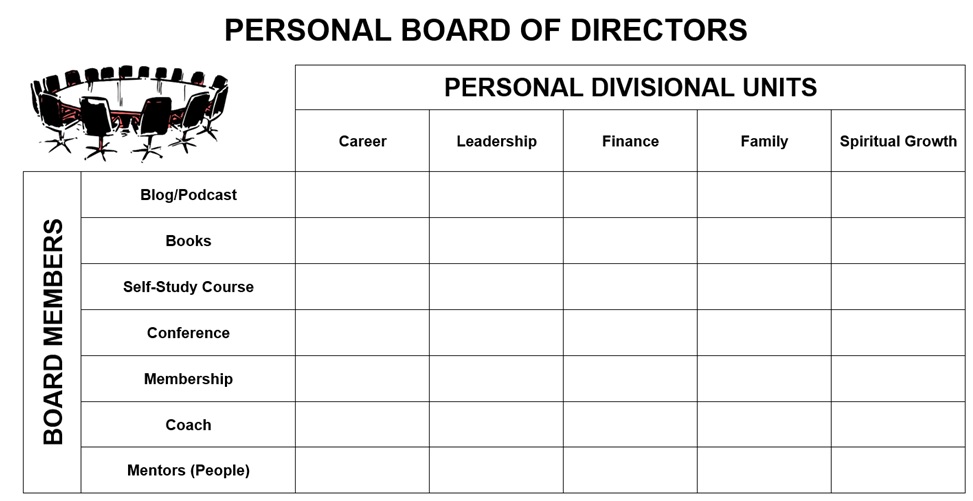Successful companies have a board of directors, and you should, too! When you embark on your personal growth journey, look beyond a mentor, and set yourself up as a successful business. We are all interested in developing our best selves, but we must be intentional about it. This article will help you commit to a personal growth plan; when you commit, you do not accept excuses—you persevere.
Mentorship in the traditional sense is a process whereby a person perceived to have greater knowledge, wisdom, or experience (the mentor) informally shares information with another (the protégé) in an effort to increase the protégé’s wisdom. A mentor can only help the protégé grow for a period of time and in a very specific way. At some point in time, the mentor/protégé relationship will plateau, possibly without either one knowing, thus hindering the protégé’s growth potential.
Businesses, on the other hand, manage their growth-related affairs through a board of directors. Conventionally, a board of directors is a group of people who collectively oversee divisional units within an organization or industry. Brian Hamilton of the Brian Hamilton Foundation lays out the following four guidelines when crafting an effective board:
- Invite people who are financially independent from you and your company.
- Look for people who aren’t afraid to voice their opinions.
- Find people who agree on the path the company is headed.
- Add people who know things you don’t.
It is often said those who only teach themselves have a fool for a teacher. Seek guidance and growth from everyone, especially those who have a different viewpoint from yours. If you consider yourself the smartest person on the board, it’s time to reorganize! You are only as good as the average of your board (i.e., your inner circle).
When you establish a personal board of directors, you gain a variety of perspectives on various divisions in your life. It is important to remember that board members can be active or passive in their roles; however, each should bring a unique set of skills and applicable expertise to the table.
Identifying Your PDUs and Board Members
What is a personal divisional unit (PDU), and how many should you identify? A PDU is anything you perceive in your life that you would like to cultivate a better understanding of or for which you’d like to increase your current performance. Some examples include:
- Career improvement and/or change;
- Leadership growth;
- Finance;
- Family; or
- Spiritual growth.
Each division could also be broken down into subdivisions, tailored to your specific needs. After you identify your PDUs, it’s time to solicit your board and begin your personal growth journey. Who can be a board member? First, do not get hung up on “who” but rather “what.” As previously mentioned, a single person will limit your possibilities. Therefore, I recommend looking at these options when filling the seats:
- Blogs and podcasts. These outlets allow you to be mentored by anyone! Would you like to receive instruction or guidance from John C. Maxwell, Tim Ferriss, Rachel Hollis, or Dave Ramsey? It’s more than likely they offer a free blog or podcast.
- Books can be physical, electronic, or audible, and they provide you with a low-cost option to get a specific thought on a specific topic from a perceived expert.
- Short courses. Most community colleges, universities, and trade organizations offer affordable courses on specific topics. Courses may be offered in person, online, and/or through a self-study format. The length of time to complete ranges from 1 hour to a week or longer. Some examples include Occupational Safety and Health Administration (OSHA) 500 or 501 or a certification preparation course.
- Certificate programs. Colleges and universities (e.g., Columbia Southern University or eCornell) offer undergraduate and graduate certificate programs in several concentrations, allowing you to develop specific skills and knowledge within a profession or topic.
- Membership sites. A membership site provides you with resources from various subject matter experts and fellow members. Some examples in the safety field include the American Society of Safety Professionals (ASSP), the National Safety Council (NSC), and the National Fire Protection Association (NFPA).
- Conferences and/or trade shows. These provide an opportunity for total immersion in a specific industry or profession. Tools, equipment, and resources are all on display, allowing for a thorough review. Multiple specific learning tracks are available, and there are ample opportunities for networking.
- If you are willing to pay for a mentor, looking into a life coach is a great option.
- Traditional mentors. Whether you have an individual person or multiple people in mind, start building relationships with them, and when the timing is right, ask them to serve on your board.
Keeping Track of Resources and Responsibilities
Use the Personal Board of Directors Matrix below to identify your PDUs and elect board members accordingly.
Anytime you ask an individual to serve on your board, I recommend establishing a set of “bylaws” so everyone in the process knows what to expect. The bylaws should be nothing more than an explanation of what is expected from the board member and what is expected from you.
- Board member responsibilities (as applicable):
- Expertise of the topic,
- Encouragement,
- Wise counsel,
- Growth experiences,
- Insightfulness,
- Self-awareness,
- Inspiration,
- Challenging ideas, and
- Sharing of critical knowledge.
- Your responsibilities:
- Value each board member’s knowledge and insights. Give and receive feedback in a professional manner.
- Engage in goal-setting, and prepare for meetings in advance.
- Follow through and be accountable. Honor your commitments.
- Listen actively, and reflect critically on your motives, passions, attitudes, thoughts, feelings, and behaviors before and after meetings.
- Acknowledge your board members’ contributions. Plan to pay it forward by mentoring someone else in the future.
A Step in the Right Direction
Even if you follow none of these guidelines, simply establishing a personal board of directors is a move in the right direction for personal and professional growth. Remember that it takes a team to raise an outcome. Knowledge comes from study, and wisdom comes from learning and improving, so establish your board of directors today, and help those you lead establish theirs, too! Embark to be a continual learner, and ask yourself three questions at the end of each day:
What did I learn today? → How did I grow today? → What will I do differently?
When you least expect it, board members can appear in your life, and they can leave just as quickly. A one-mentor-fits-all approach is not the best, as there are many needles that will move you through your career and life. As you grow, evolve, and change, you should seek new guidance along the way that is specific to your personal and professional growth to help you become the best version of yourself.


